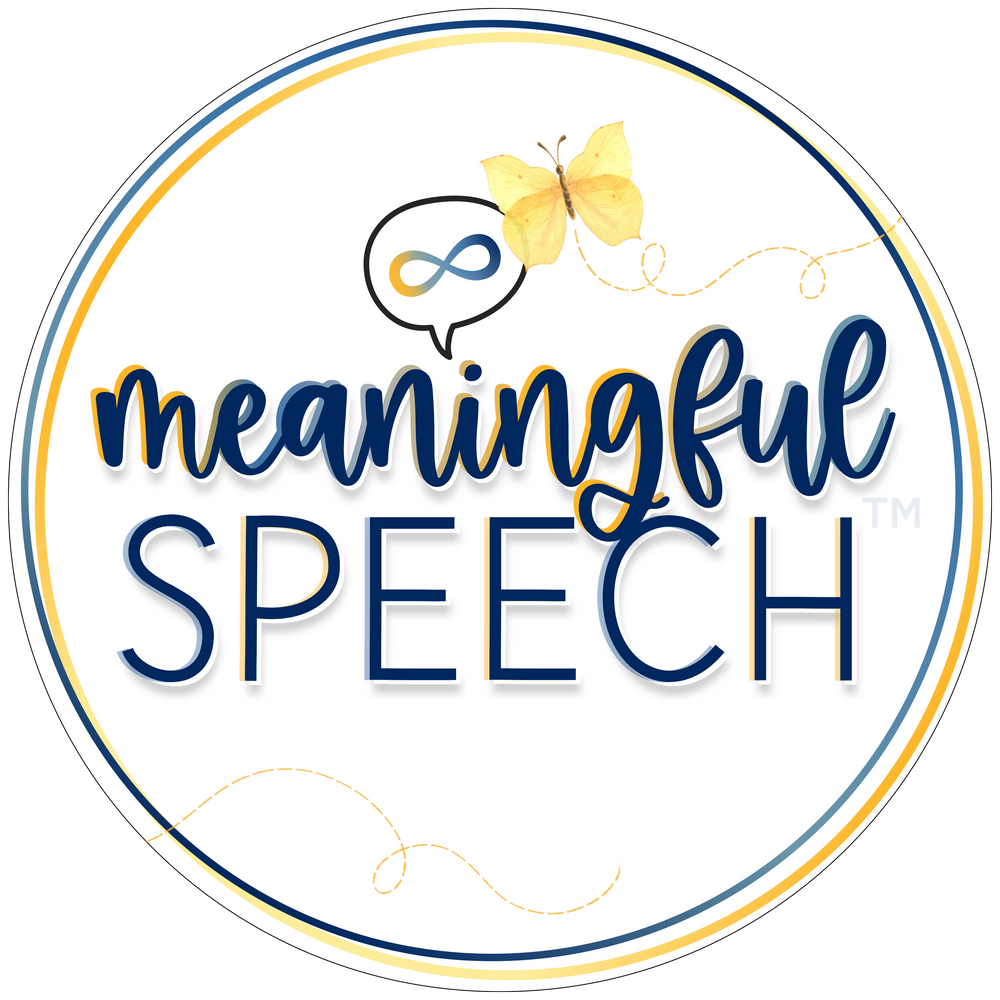How to help others communicate and connect with a Gestalt Language Processor
Nov 12, 2025
Start by educating them about gestalt language development
To help family members and others better connect and communicate with a gestalt language processor, it’s important to help them understand gestalt language development so that they can better understand the importance of the strategies we use to support them. Educating others while supporting your child or student might seem like an intimidating task. Here are some tips on how to educate others and address the skeptics:
- Give a brief explanation of language development. Here’s an example/ script of the information you might provide and what you might say:
- “Did you know there are two ways humans develop language? Yeah I didn’t either! The way we are taught in school (or life) is that babies start babbling and then use words, combine words, and then make sentences and eventually toddlers and preschoolers have conversations with us. That’s called analytic language development. There is another way though! It’s called gestalt language development. These kids start out focused on intonation and not words. They hear the melody of the language we use and communicate using language they hear others (or media) often with the same intonation of the original speaker, which also holds the meaning of the experience for them. For example if someone says “that’s a big dog!”, they might pick that up and use it later whenever they see a dog, an animal or anything that reminds them of that experience. They might use the same intonation the original speaker used. This is their first stage of language development and it’s called delayed echolalia. There are six stages and eventually these children can get to original, flexible language just like analytic language processors. Gestalt language processors need different language support, because they process language differently. (Child’s name) is a gestalt language processor and needs us to use an approach that best fits their language development”
- Talk about what gestalt language processors need.
- Acknowledge all of their communication without trying to correct it or force them to say something different. We can acknowledge their communication by smiling, nodding our heads, repeating what they said back to them, or saying “yea” or “okay”. Do this even if you can’t understand the script or it’s been labeled as jargon.
- Don’t try to eliminate or extinguish their gestalts/scripts. It is meaningful!
- They need us to investigate what their gestalts/scripts mean. They are rarely literal.
- They need us to model natural language during the activities we share. Gestalt language processors need more mitigable (easy to mix and match and/or trim down) gestalts. Gestalt language processors will mix and match parts of these Stage 1 gestalts together in Stage 2 and/or trim down longer Stage 1 gestalts. Stay away from using pronouns like “you” and “you’re” when modeling language. Model from the child’s perspective (“I’m hungry” rather than “you’re hungry”) or a joint perspective (“Let’s get a snack”).
- They need us to eliminate questioning and focus on commenting and narrating (declarative language) and modeling natural language.
- Follow the child’s lead. Gestalt language processors are best supported in the most natural, intrinsically motivating environments. Play what they want to play, how they want to play (with safety in mind) and model language naturally while following their lead.
How to deal with the skeptics
When educating others you might run into skeptics. Here are some common questions or comments they might make, and how you might respond:
- “How do you know they are a gestalt language processor?”
- Rich intonation
- “Stuck” single words
- Unintelligible long strings of language
- Long media scripts/gestalts
- I know this child is a gestalt language processor because they have (they might have all, some, or just one of these):
- “They’re not scripting/they’re not speaking, how can you be sure?”
- Rich intonation
- Gestalt cognitive processing (whole to part thinking, experiences are held primarily as episodic memories)
- Echopraxia (gestalts with body movements)
- Listening (and learning) from scenes/bytes of media or audio clips
- They are very musical (drawn to songs and song melodies, they might hum or sing songs even if not “speaking” yet)
- Uses an AAC device but they are “stuck” using single words with limited spontaneous use of words across contexts
- You can still determine if a child is a gestalt language processor even if they’re non-speaking, minimally speaking, and/or not using gestalts.
- “Is there research to back this up?”
- Yes there is! Provide them links to our website where they can download and read all of the research on gestalt language development: https://www.meaningfulspeech.com/research-and-resources.
- “Why haven’t I heard about gestalt language processing before?”
- Most people don’t know about it because it’s not being taught in most graduate programs. However, the American Speech-Language Hearing Association (ASHA) recognizes gestalt language development and there are online articles and webinars on it. This information was common knowledge for many speech-language pathologists practicing back in the 1980’s. Unfortunately, the field of speech-language pathology swung in a different direction towards behaviorism and away from this very important information. Now, this information is spreading again and more and more speech-language pathologists are learning about it, changing their approaches and seeing their career and the progress of their clients change for the better.
- What if they’re not really a gestalt language processor or you’re not 100% sure?
- That’s okay! The information and strategies we teach can benefit any child’s language development. What we’re discussing here is shifting focus from compliance to connection through child-led therapy and play. As well as focusing on natural language modeling through use of declarative language (commenting and narrating) and reducing questioning and eliminating prompting or cueing. Modeling without expectation. A child who might be an analytic language processor can benefit from all of this too. They will take what they need from the language models we provide (single words). However if we use analytic language strategies with gestalt language processors it is not equally supportive. Using analytic strategies with gestalt language processors may hold them back and keep them in the early stages (delayed echolalia) of their language development.
Something important to also remember is that many people are scared to admit they don’t know something or are scared to learn something new. All big change starts small. Many may frown upon learning new information online or through Instagram where much of the information on gestalt language development currently is being taught. There is no doubt social media and the internet can be filled with misinformation, but it can also be a very powerful tool that can bring positive change and needed information to many.
Supporting Each Other Along the Way
Learning about gestalt language development can be eye-opening. You might find yourself wondering what a gestalt means, how to respond when your child repeats something out of context, or how to explain gestalt language development to others who don’t yet understand it. That’s exactly why we created the Meaningful Connections Community for parents and caregivers.
Inside, you’ll find:
- A private forum for conversations with those who GET it.
- Quarterly recorded live sessions with Jessi, a parent of two autistic gestalt language processors, and guests (other parents and professional experts). These will be recorded and available for those who cannot attend live.
- A library of free educational handouts and resources.
- Opportunities to connect with other caregivers locally, virtually or through the online directory where you can see who is online and start a conversation.
- A free ticket to our upcoming webinar for caregivers : A Caregiver’s Guide to Supporting your Echolalic Child which will take place in December 2025 and will be recorded for those who cannot attend live. More information to come.
Those that join in November 2025 will get the membership for only $5/month. After that, the price will increase.
Our team created this private community because we’ve seen how powerful it is when parents come together to share experiences, ask questions, and support one another. Meaningful Connections was built for that purpose. It is a safe space where you can learn at your own pace, surrounded by people who truly understand. Learn more about it HERE and/or join today!
Want to learn more in-depth information about how to support gestalt language processors?
- There are many free podcasts, webinars and articles to get you started. A comprehensive list of resources can also be found on our website and Communication Development Center's website.
- Consider taking the Meaningful Speech course to learn more about how your child or client processes language, how you can help support them from echolalia to self-generated (original flexible) language, child-led therapy, and neurodiversity-affirming practices.
- Consider taking our AAC + Gestalt Language Processing course . It will teach you how to identify, evaluate and support gestalt language processors who use AAC or who you think might benefit from AAC.
- Look for a speech-language pathologist (SLP) who "gets it" and can help you in supporting your child's language development. Check out our registry. for SLPs who understand gestalt language processing and child-led therapy.
- Are you a school-based or private practice clinician looking for intake forms for new clients/students or creative visual reminder posters for your space? Check out the Meaningful Speech Marketplace.
